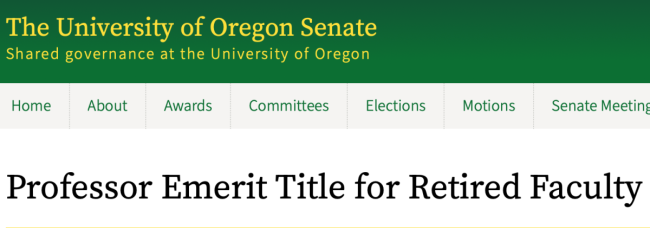You have /5 articles left.
Sign up for a free account or log in.

University of Oregon Senate motion on professor emerit title
University of Oregon Senate
Professor emeritus or emerita—the gender-dependent title some faculty members are awarded upon retirement—signals esteem, accomplishment and, often, continued involvement in campus life. But does it have to signal male or female? Professors at two Oregon institutions think that it doesn’t, and that it shouldn’t. So they’re asking their colleagues to consider adopting a gender-neutral alternative.
One such idea is “professor emerit.”
“Why should the title have anything to do with gender? It’s not a demographic category, it’s a professional title,” said Jennifer Freyd, who retired from the University of Oregon’s psychology department last year and uses the title professor emerit. “It’s time to be a little more enlightened.”
Freyd is a co-sponsor of two resolutions before the University of Oregon Senate. The first motion calls for the university to “use non-gendered language to refer to retired faculty” in all formal policies and websites. It argues that gendered language in professional titles contributes to gender discrimination and that binary gender choices force nonbinary people to choose one or the other.
Moreover, the motion says, “current language used by the University of Oregon for emeritus faculty is both gendered in usage (emeritus/emeriti for men and emerita/emeritae for women) when there is nothing about the position that should vary by gender as well as forcing a binary distinction.”
Defaulting to the (masculine) “professor emeritus” or (masculine) plural “professors emeriti” for all genders “would not solve the current problem, in that those terms currently carry gendered meaning,” the motion continues. “To the extent emeritus can be used to refer to either just men or both men and women, it operates as the ‘unmarked’ (e.g., default or normal) case, implying that maleness is the default and femaleness is the exception.” Case in point? The university’s long-standing policy on how to become a professor emeritus or emerita defaults to the masculine: “Faculty: Rights and Privileges of Emeritus Faculty.”
Other examples of gendered terms, which are already falling out of use, according to the motion, include “chairman, alumnus, fireman, stewardess, and even just ‘man’ to mean human.”
The second motion before the University of Oregon Senate is about whether “professor emerit” is the appropriate replacement for “professor emeritus” or “emerita.” Freyd and her co-sponsors originally approached the Senate with a single resolution proposing the elimination of gendered terms and “professor emerit” as a replacement. But they were advised to split the resolutions, lest the term “emerit” prove more controversial than eliminating gendered terms in general.
Freyd is of course a fan of “professor emerit,” as she’s been using it for nearly a year herself. It retains some of the “preciousness” of the original Latin that academics seem to like, she said. And it’s close enough to “professor emeritus” or “emerita” that using it wouldn’t confuse someone reading a student recommendation letter she’s signed, for instance.
People do sometimes ask if she’s made a typo, Freyd said, but that can be solved by a short explanation or hyperlinking to a definition of “emerit” in her email signature block.
Freyd figures this is only a “temporary problem,” anyway.
“I’m, like, the only person doing this right now, or one of the only ones, so it’s not widespread and not understood. But I think that as this spreads, people will get educated and understand.”
Emeritus by Any Other Name
Gender matters professionally and personally to Freyd, who has studied interpersonal violence and institutional betrayal—including when institutions let down survivors of sexual assault—throughout her career. She also sued Oregon for gender-based pay discrimination prior to retiring, settling with the university for $450,000 (including $100,000 for her nonprofit, the Center for Institutional Courage) last summer. But her motions have seven co-authors from different fields, including some men, and apparent early traction within the Senate—with caveats.
Spike Gildea, professor of linguistics and president of the Senate, said that in a recent meeting of the Senate Advisory Group, “every single voice supported the first motion, and I expect the full Senate is likely to approve removing the overtly gendered terms from university policy.”
There was little agreement among the group regarding the emerit term, however, Gildea said. The second motion could therefore shift “to a process by which we get more input from across campus before voting on the replacement term” or terms.
It’s important that the motions don’t affect how faculty members choose to refer to themselves, Gildea also said. “This motion is not about imposing a single choice on individuals but about stopping the university from imposing a gendered term on all retirees at the level of university policy.” (Freyd agreed, saying she had no interest in “legislating” what professors call themselves—even if it’s “professor emeritus” or “professor emerita.” Language to this effect is part of the second motion before the Senate.)
Where does Gildea stand on “emerit”? He said it’s “marginally better than the gendered terms” but that he sides with those who say it adds yet another layer of confusion to the conversation.
Gildea’s preference: using the English “professor retired with merit” or “professor retired with honor.”
Dare Baldwin, professor of psychology at Oregon and a motion co-sponsor, said any solution should satisfy requirements: it doesn’t bring gender into the professional label, it has no inherent gender bias and it’s easy for English speakers to pronounce.
As for whether “emerit” is too unprecedented to be helpful, Baldwin said, “In English we use forms that used to be gendered already. Alum, or alums, is now common parlance. Adjunct [as opposed to the Latin masculine adjunctus or feminine adjuncta] is also common parlance. So ‘emerit’ works nicely for all those goals.”
Molly Blancett, university spokesperson, said that if the Senate motions pass, Oregon leaders will work with the Senate to adjust related university policies. Both motions could be up for a vote as soon as Feb. 23.
Oregon State University is also considering changing its professor emeritus policy. Alan Mix, distinguished professor of earth, ocean and atmospheric sciences there, said he shared the idea with colleagues after reading a journal article that Freyd published about the need for gender-neutral titles for retired professors last year.
Mix said this wasn’t something he’d given too much thought to prior to seeing the article, but he thought the idea seemed “reasonable.”
“It’s kind of weird that as professors our titles don’t have genders, and then all of a sudden, magically, we acquire gender when we become emeritus,” he said. “It’s just kind of weird when you think about it. An artifact of history.”
No formal resolution has been introduced so far at Oregon State, but Richard Settersten, vice provost for faculty affairs, said, “We’re in conversation with Faculty Senate leaders about title options and how to get it adopted.”
Mix said he couldn’t predict what term might replace “emeritus” or “emerita,” as “my impression is you can put six academics in a room and get 12 different opinions.” Already, he said, questions have been raised as to whether “emerit” should be “emeritum,” in an attempt at honoring the Latin neuter (this alternative was suggested at UO, as well, though Freyd, Baldwin and some others oppose it on the grounds that it’s more appropriate for inanimate things than people).
In any case, Mix said, “I’m really pretty optimistic about this. The whole thing just seems kind of obvious to me—thought it’s not obvious until somebody brings it forward, and then it becomes obvious, right? Which is the beauty of it.”









